orogeny
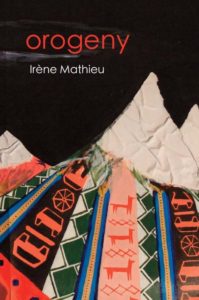
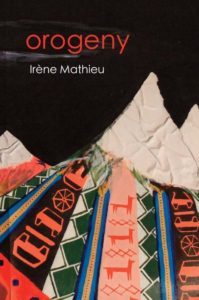 by Irène Mathieu
by Irène Mathieu
$16.00 | Jan 2017
Winner of the 2016 Bob Kaufman Prize, selected by Megan Kaminski
US Domestic Shipping Only
Orogeny buries deep into rock and soil, silence and speech, into the pulse of what connects us as mothers, sisters, lovers, and ghosts—the quest for home and for a language that can account for both what might become and what has been lost. Searching ecologies, history, and embodied experience, Irène Mathieu’s lyric voice pieces together a world, which is at once our own and a map of possibility, a “fetal dream of ourselves, a sea of curled and floating ideas.”
—Megan Kaminski, author of Deep City, judge of the 2016 Bob Kaufman Book Prize
In orogeny, wisewoman and mythkeeper Irène Mathieu fiercely erects a “pharmacy of noises,” a mountain of love poems to what it means to be precariously human, an awakening fist armed with the might of dreams against the things that plague the earth and us: murder, hate, wars, borders. This collection is a hymn for the puzzling anatomy of survival, the evolution of rage, and the healing prism of wanderlust. These poems serve as “proper rites” against the violence of language that accompanies what has become the world’s textbook physical ruthlessness. Mathieu penetrates the dust and fragments of our earthly existence—all that’s been lost and left behind—and sings it back together. I could “drink these poems” with their old eyes for an eternity, and they would be enuf, all I need.
—Yolanda Wisher, author of Monk Eats an Afro, Poet Laureate of Philadelphia 2016-17
It’s apt that one of the central images of orogeny is that of Pangaea because Irène Mathieu broke me, over & over & over & infinite. Orogeny takes its reader across many different histories–of family, of continents, of violences, of sciences, of dirts, of fears, of soils, of loves–and every one is bigger than the last. It asks its reader, “what do I deserve?” and while the reader stares at it in amazement it answers “everything inside the moon.” In an existence as fractured as this one, orogeny is not just the myth that we need; it’s the then (& now & future) that we deserve.
– Mark Cugini, author of I’m Just Happy to Be Here, managing books editor, Big Lucks Books
About the Author
 Irène Mathieu is a pediatrician, writer, and public health researcher who has lived and worked in the United States, the Dominican Republic, Guatemala, Peru, and elsewhere. She has been a Pushcart Prize nominee, a Callaloo fellow, and a Fulbright scholar. Irène is the author of the poetry chapbook the galaxy of origins (dancing girl press, 2014). She holds a BA in International Relations from the College of William & Mary and a MD from Vanderbilt University.
Irène Mathieu is a pediatrician, writer, and public health researcher who has lived and worked in the United States, the Dominican Republic, Guatemala, Peru, and elsewhere. She has been a Pushcart Prize nominee, a Callaloo fellow, and a Fulbright scholar. Irène is the author of the poetry chapbook the galaxy of origins (dancing girl press, 2014). She holds a BA in International Relations from the College of William & Mary and a MD from Vanderbilt University.

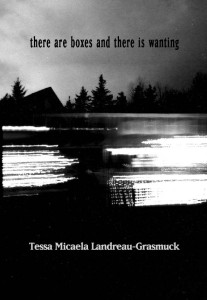
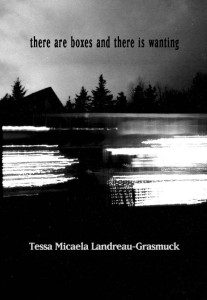 by Tessa Micaela Landreau-Grasmuck
by Tessa Micaela Landreau-Grasmuck Tessa Micaela Landreau-Grasmuck was born in Philadelphia and currently resides in Oakland with her dog, Ramona Pickle. Tessa has waited tables, bound books, worked as an abortion counselor, reproductive health educator, and birth doula, taught writing in the San Francisco county jail, studied herbalism, and carved out time to write between it all. Tessa was granted the first Community Poetics Fellowship from Mills College, where she received her MFA in 2013. Tessa is the author of the chapbook Crude Matter (ypolita press, 2015). Other writing has appeared in Make/shift, Dusie, Open House, Sink Review, and various other jars and corners. there are boxes and there is wanting is her first book.
Tessa Micaela Landreau-Grasmuck was born in Philadelphia and currently resides in Oakland with her dog, Ramona Pickle. Tessa has waited tables, bound books, worked as an abortion counselor, reproductive health educator, and birth doula, taught writing in the San Francisco county jail, studied herbalism, and carved out time to write between it all. Tessa was granted the first Community Poetics Fellowship from Mills College, where she received her MFA in 2013. Tessa is the author of the chapbook Crude Matter (ypolita press, 2015). Other writing has appeared in Make/shift, Dusie, Open House, Sink Review, and various other jars and corners. there are boxes and there is wanting is her first book.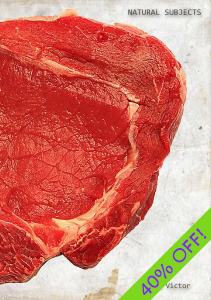
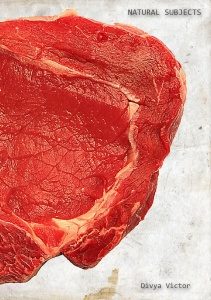 by Divya Victor
by Divya Victor Divya Victor is the author of Things To Do With Your Mouth(Les Figues, 2014), Natural Subjects (Trembling Pillow, 2014), and Unsub (Insert/Blanc, 2015). She is also author of the Partial series (Troll Thread), Punch (2011), Goodbye John! On John Baldessari (2012), and Swift Taxidermies (2014), all from Gauss PDF; and the chapbook Hellocasts by Charles Reznikoff by Divya Victor by Vanessa Place (2011). She divides her time between the United States and Singapore, where she is Assistant Professor of Poetry and Poetics at Nanyang Technological University.
Divya Victor is the author of Things To Do With Your Mouth(Les Figues, 2014), Natural Subjects (Trembling Pillow, 2014), and Unsub (Insert/Blanc, 2015). She is also author of the Partial series (Troll Thread), Punch (2011), Goodbye John! On John Baldessari (2012), and Swift Taxidermies (2014), all from Gauss PDF; and the chapbook Hellocasts by Charles Reznikoff by Divya Victor by Vanessa Place (2011). She divides her time between the United States and Singapore, where she is Assistant Professor of Poetry and Poetics at Nanyang Technological University.
 by Jen Coleman
by Jen Coleman Jen Coleman was born in Minnesota in 1970. She earned a BA in Theater from Beloit College, and worked briefly at a circuit board factory, a three ring binder factory, a blanket factory, a gas station, as a theater electrician and as a schoolbus driver. She earned an MFA in poetry from George Mason University. There, she studied with Susan Tichy, Peter Klappert and Carolyn Forché. Her work was further shaped by the Washington, DC, poetry community. While in DC, Jen co-hosted with Allison Cobb a season of the DCAC “In Your Ear” reading series and completed a collaborative chapbook with CE Putnam and Allison Cobb entitled Communal Bebop Canto. Jen and Allison moved to New York in 2000, where they joined Ethan Fugate and Susan Landers in editing six issues of Pom2, “a journal of poetic polylogue.” While in DC and New York, Jen worked for Environmental Defense Fund. Jen and Allison moved to Portland, Oregon in 2008, where they live with their dog, Quincy. In Portland, Jen participated in the 13 Hats collaborative of artists and writers. She co-hosts readings with the Spare Room Collective and works for Oregon Environmental Council. This is her first full-length volume.
Jen Coleman was born in Minnesota in 1970. She earned a BA in Theater from Beloit College, and worked briefly at a circuit board factory, a three ring binder factory, a blanket factory, a gas station, as a theater electrician and as a schoolbus driver. She earned an MFA in poetry from George Mason University. There, she studied with Susan Tichy, Peter Klappert and Carolyn Forché. Her work was further shaped by the Washington, DC, poetry community. While in DC, Jen co-hosted with Allison Cobb a season of the DCAC “In Your Ear” reading series and completed a collaborative chapbook with CE Putnam and Allison Cobb entitled Communal Bebop Canto. Jen and Allison moved to New York in 2000, where they joined Ethan Fugate and Susan Landers in editing six issues of Pom2, “a journal of poetic polylogue.” While in DC and New York, Jen worked for Environmental Defense Fund. Jen and Allison moved to Portland, Oregon in 2008, where they live with their dog, Quincy. In Portland, Jen participated in the 13 Hats collaborative of artists and writers. She co-hosts readings with the Spare Room Collective and works for Oregon Environmental Council. This is her first full-length volume.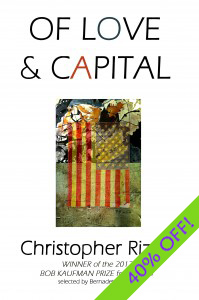
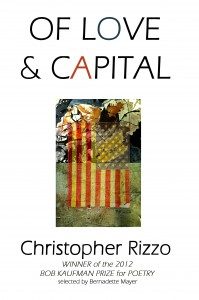
 Christopher Rizzo is a poet, scholar, and editor who lives in Albany, New York. Awarded the Academy of American Poets’ Phyllis Hurd Liston Poetry Prize in 2011, Christopher has published a range of critical and creative work in numerous magazines and journals, both in print and online. The founding editor of Anchorite Press, he currently lectures at the University at Albany, where he is finishing his doctorate in English on twentieth century American poetics. His latest full length collection of poetry, Near Point Balance, is forthcoming from Skysill Press.
Christopher Rizzo is a poet, scholar, and editor who lives in Albany, New York. Awarded the Academy of American Poets’ Phyllis Hurd Liston Poetry Prize in 2011, Christopher has published a range of critical and creative work in numerous magazines and journals, both in print and online. The founding editor of Anchorite Press, he currently lectures at the University at Albany, where he is finishing his doctorate in English on twentieth century American poetics. His latest full length collection of poetry, Near Point Balance, is forthcoming from Skysill Press.